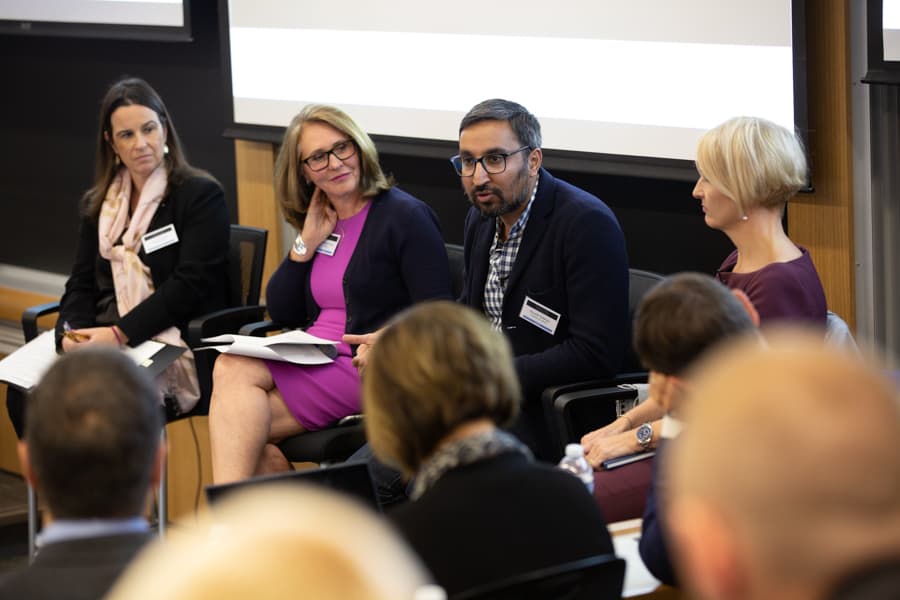Asset owners and managers can help solve modern slavery and invest to stem the suffering of the 40.3 million workers in the world trapped in some form of labour abuse in what Fiona Reynolds, chief executive, PRI, and chair of The Financial Sector Commission on Modern Slavery and Human Trafficking called “a huge and growing human tragedy.”
Speaking at the Fiduciary Investors’ Symposium at Harvard University, Reynolds outlined the scale of the illegal industry, worth an estimated $150 billion annually. It costs countries battling to counter it dearly, and impacts women and children the most.
“One in four victims are children,” she said.
Timea Nagy Payne wasn’t a child when she was trafficked. But her ordeal working as a sex slave in Canada where she was trafficked from eastern Europe thinking she was travelling to work as a nanny tipped her life into chaos.
“My life was taken,” she told delegates. A feeling which endured long after her escape.
Reintegrating into society and “becoming a real person” took years due to a combination of trauma, financial exclusion, language barriers and the fact “nobody wants to hire victims,” she said.
Modern slavery is a market failure that governments cannot solve on their own, said Reynolds.
The need for solutions based on expertise from the public and private sectors was the genesis behind last year’s establishment of The Financial Sector Commission on Modern Slavery and Human Trafficking.
Rather than just detail the problems, its inaugural blueprint strives to provide the financial world with action-orientated steps outlined in five goals that investors and banks can use to help solve the problem.
Reynolds told delegates the banking sector “had stepped up” to navigate privacy rules that allowed the Commission to get the information it needed, and urged the financial community to use the leverage it has, particularly around building financial inclusion and preventing slavery in supply chains.
“Lots of companies say they are not responsible for their supply chains, but this is not an answer.”
She noted that microfinance was a crucial tool to help rebuilding victims’ access to the financial system.
Hiding in plain sight
“You all influence the supply chain,” Sharon Prince, chair and president, Grace Farms Foundation which works to raise awareness of the prevalence of forced labor in construction projects, present on building sites and in the building material supply chain – particularly timber, told delegates.
“Banks and insurers have the ability to get full disclosure; you also own projects. You don’t want to be invested in a supply chain that uses forced labour.”
She warned delegates that companies are often subsidizing their business with slavery, and that these companies are “part of the ecosystem.”
She said investors wield “lots of power in terms of compliance.”
Modern slavery is illegal in most countries with landmark acts like the UK’s Modern Slavery Act and similar regulations in Australia and the Netherlands driving change.
Elsewhere the US’s supply chain transparency regulation “doesn’t have much teeth” but could affect multinationals.
“Modern slavery a developed country issue hiding in plain sight,” she said.
Poor relation Social issues are the “poor cousin” in ESG, said Anders Stromblad, head of external managers, AP2.
“There is a lot of focus on climate and governance, but social issues are more difficult,” he said.
One reason for that is a lack of data and corporate transparency, he said.
“We shouldn’t think of it in silos because we live in a more complex world. Regulation is coming out and this area will continue to grow.”
Perhaps countries should look to Brazil, a surprising leader in supply chain transparency. Authorities now publish details available to all of blacklisted corporations and farms where slavery has been prevalent. Detailed information on laggards available in a “dirt list” allows companies to source their goods responsibly and banks to check before granting loans, said Leonardo Sakamoto, journalist and member of the board of trustees, UN Trust Fund on Contemporary Forms of Slavery and commissioner, The Financial Sector Commission on Modern Slavery and Human Trafficking.
“If a company is on the list it will have problems raising money on the stock market,” he said. “Brazil has developed lots of tools to help companies be open and transparent here and we are getting results.”
Amol Mehra, managing director, Freedom Fund also warned delegates of the growing regulatory risk around modern slavery. Strengthening regulation around human rights and modern slavery, driven in a large part by civil society, will increasingly impact companies.
“Governments are flexing their regulatory muscle,” he said. “Look at this in your investment portfolios.”
Mehra flagged that regulations around prohibited goods from the mining (particularly Cobalt) and apparel sectors because of these industries’ links to slavery, will increasingly tighten.
“These are all supply chains with known risk,” she said.




